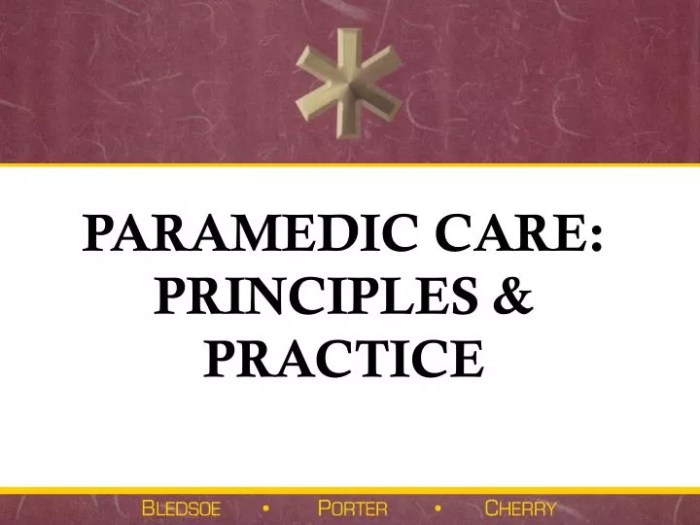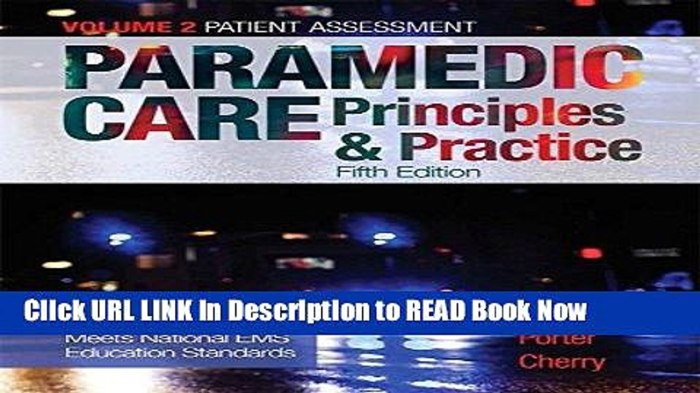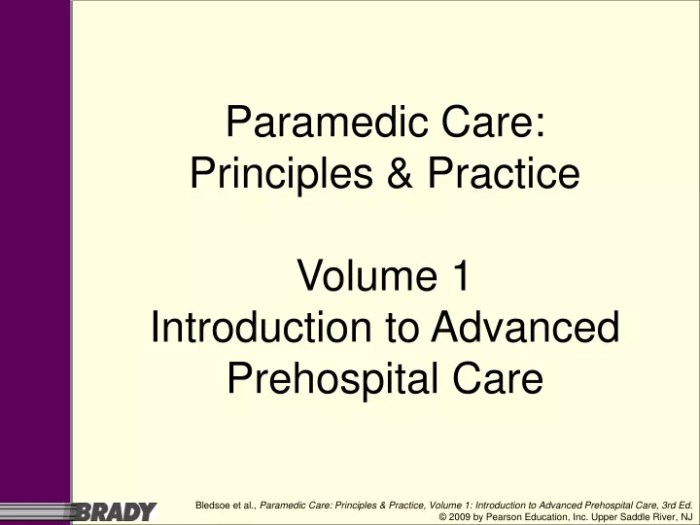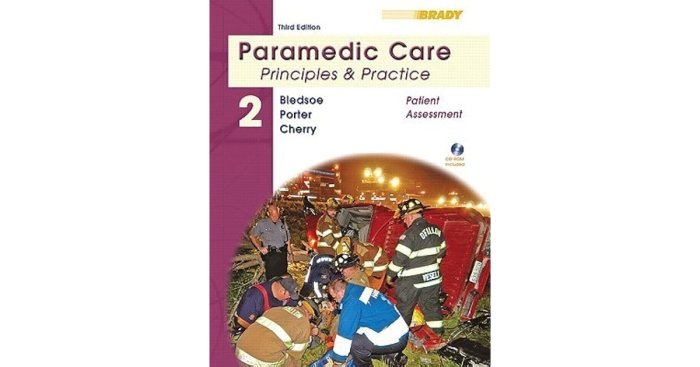Paramedic care principles and practice 6th edition – Paramedic Care Principles and Practice, 6th Edition, offers a comprehensive and up-to-date exploration of the foundational principles guiding paramedic practice, including patient assessment, treatment, and transportation. With a focus on real-world scenarios and the ethical and legal implications of paramedic care, this edition provides a thorough examination of the field.
Through systematic approaches to patient assessment, triage, and prioritization, readers gain a deep understanding of the decision-making processes involved in emergency medical care. The text also explores the various treatment modalities employed by paramedics, including medications, oxygen therapy, and airway management.
Core Principles of Paramedic Care: Paramedic Care Principles And Practice 6th Edition

Paramedic care is guided by foundational principles that ensure the provision of safe, effective, and compassionate care to patients in emergency situations. These principles include:
- Patient-centered care: Focusing on the patient’s needs, values, and preferences.
- Evidence-based practice: Utilizing the best available scientific evidence to inform clinical decisions.
- Ethical and legal considerations: Adhering to ethical guidelines and legal regulations while providing care.
- Interprofessional collaboration: Working effectively with other healthcare professionals to provide comprehensive patient care.
- Quality improvement: Continuously evaluating and improving the quality of care provided.
These principles guide paramedics in their assessment, treatment, and transportation of patients, ensuring that they receive the highest quality of care.
Patient Assessment and Management

Patient assessment is a systematic process that involves gathering information about the patient’s condition and identifying potential problems. Paramedics use a variety of techniques to assess patients, including:
- History-taking: Asking the patient about their symptoms, medical history, and medications.
- Physical examination: Performing a physical examination to assess vital signs, skin color, and other physical findings.
- Diagnostic testing: Using diagnostic tools such as blood glucose meters, pulse oximeters, and electrocardiograms to gather additional information.
Based on the assessment findings, paramedics prioritize patients and determine the most appropriate course of treatment. Treatment modalities used by paramedics include:
- Medications: Administering medications to relieve pain, reduce inflammation, or treat underlying medical conditions.
- Oxygen therapy: Providing supplemental oxygen to improve oxygenation.
- Airway management: Establishing and maintaining a patent airway using techniques such as suctioning, bag-valve-mask ventilation, or intubation.
Paramedics also provide ongoing monitoring and reassessment of patients during transport to ensure their condition remains stable.
Trauma Management

Trauma management is a critical component of paramedic care, as trauma is a leading cause of death and disability worldwide. Paramedics play a vital role in the assessment and management of trauma patients, including:
- Scene safety: Ensuring the safety of the scene and stabilizing the patient’s environment.
- Hemorrhage control: Stopping bleeding using techniques such as direct pressure, tourniquets, and hemostatic agents.
- Airway management: Establishing and maintaining a patent airway using techniques such as suctioning, bag-valve-mask ventilation, or intubation.
- Shock management: Managing shock by providing fluids, vasopressors, and oxygen.
Paramedics also provide ongoing monitoring and reassessment of trauma patients during transport to ensure their condition remains stable and to identify any potential complications.
FAQ Summary
What are the core principles of paramedic care?
The core principles of paramedic care include patient assessment, treatment, and transportation, guided by ethical and legal considerations.
How does the book address the assessment and management of trauma patients?
The book provides a comprehensive overview of trauma management, covering scene safety, hemorrhage control, airway management, and the different types of traumatic injuries and their treatment.
What is the importance of interprofessional collaboration in paramedic care?
Interprofessional collaboration is crucial in paramedic care, as it involves working closely with physicians, nurses, and other healthcare professionals to provide seamless and effective patient care.
